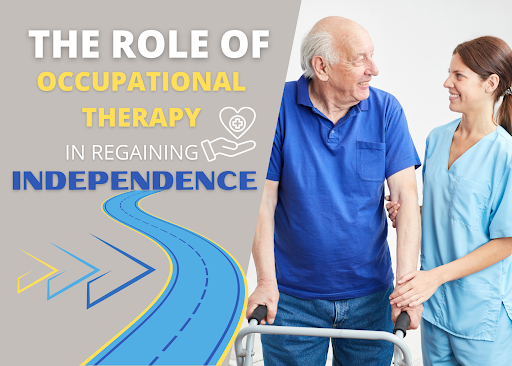
When we think about occupational therapy (OT), many of us may immediately associate it with driving rehabilitation, but the role of an occupational therapist (OT) goes far beyond just helping people get back on the road. Occupational therapy is crucial in all aspects of life, assisting individuals with disabilities to regain independence, increase their functional mobility, and improve their quality of life. Whether it’s performing everyday tasks, overcoming physical limitations, or adapting the environment to suit their needs, OTs are experts in fostering independence and empowering people to live their lives fully.
What Is Occupational Therapy?
Occupational therapy is a health profession that focuses on helping individuals perform daily activities (or “occupations”) with ease, despite any physical, cognitive, or emotional challenges they may face. OTs work with people of all ages, from children to the elderly, helping them engage in meaningful activities, manage disabilities, and ultimately lead more independent lives. For those with disabilities, OT can be the key to overcoming barriers that affect daily tasks, from dressing and eating to driving and working.
OT and Its Role in Regaining Independence
While driving is often a major part of regaining independence, occupational therapists are involved in many other areas of a person’s life. OTs focus on:
- Improving Fine and Gross Motor Skills:
Many individuals with disabilities or those recovering from an injury may struggle with movement. OT can help individuals strengthen their fine motor skills, such as hand-eye coordination, which are crucial for tasks like gripping a steering wheel or using hand controls. Gross motor skills, such as walking, balancing, and reaching, are also targeted to improve coordination and stability. - Adapting Daily Tasks:
An OT’s role involves finding creative ways to help people adapt to their daily tasks. For example, an OT might suggest specialized tools for dressing, eating, or cleaning, or they might help individuals develop strategies for completing household chores. If someone is recovering from an injury, the therapist will teach them to adapt their environment and tasks to facilitate recovery, gradually increasing their independence. - Creating a More Accessible Living Space:
OTs often collaborate with families and caregivers to modify living environments, ensuring that individuals can access all areas of their home safely and independently. Whether it’s installing grab bars in bathrooms, widening doorways, or offering alternative seating arrangements, the goal is to make daily life safer and more manageable. - Mental Health and Emotional Support:
Independence isn’t just about physical abilities—it also involves emotional health. OTs often address mental health concerns, such as depression or anxiety, that might arise when individuals face challenges related to their disability. By encouraging positive thinking, setting achievable goals, and fostering a sense of accomplishment, OTs help boost confidence and mental well-being. - Support with Work and Leisure Activities:
Occupational therapists help individuals return to work or hobbies that are important to their sense of purpose and joy. Whether it’s finding adaptive equipment for a workstation or exploring new hobbies that are more suited to their needs, OTs create plans for success. For individuals with disabilities, pursuing leisure activities or returning to work can be a powerful way to regain a sense of normalcy and pride.
OT and Driving Independence
While driving might be one of the first goals for many individuals working with an OT, it’s part of a bigger picture. OTs are trained to assess each person’s specific needs, create individualized plans, and ensure that driving is just one of many areas of independence. When an individual with a disability wants to get behind the wheel, an OT evaluates the person’s physical abilities, cognitive function, and emotional readiness. They may suggest adaptive driving equipment, such as hand controls or steering aids, or recommend modifications to the car that improve comfort and safety.
Occupational therapists often work alongside other healthcare providers, such as physical therapists, optometrists, and physicians, to provide holistic care that addresses all aspects of a person’s independence. They are an essential part of helping individuals regain confidence, not only as drivers but in their daily lives.
Why OT Is Essential for Regaining Independence
The journey toward independence involves far more than learning how to drive. It’s about gaining the confidence to live life fully, with autonomy, and participating in activities that contribute to a rich, rewarding life. For individuals with disabilities, regaining independence often involves multiple layers of support, with occupational therapy playing a foundational role. It’s about more than just getting back to normal—it’s about creating a new normal that empowers individuals to achieve their personal goals, whatever those may be.
Conclusion
Occupational therapy is an essential part of the recovery and adaptation process for individuals with disabilities, playing a key role in regaining independence across various aspects of life. Whether it’s improving motor skills, adapting daily tasks, or helping individuals get back behind the wheel, OT empowers people to live their lives with confidence, autonomy, and joy. If you’re looking to regain independence, whether through driving, work, or daily tasks, consider reaching out to an occupational therapist for guidance and support. They’re not just helping you “get by”—they’re helping you thrive.
At Driving to Independence, we understand the importance of a personalized approach to adaptive driving and independence. If you’re looking to explore driver rehabilitation or need advice on how to regain your mobility, contact us today. We are here to support you every step of the way on your journey toward independence.
